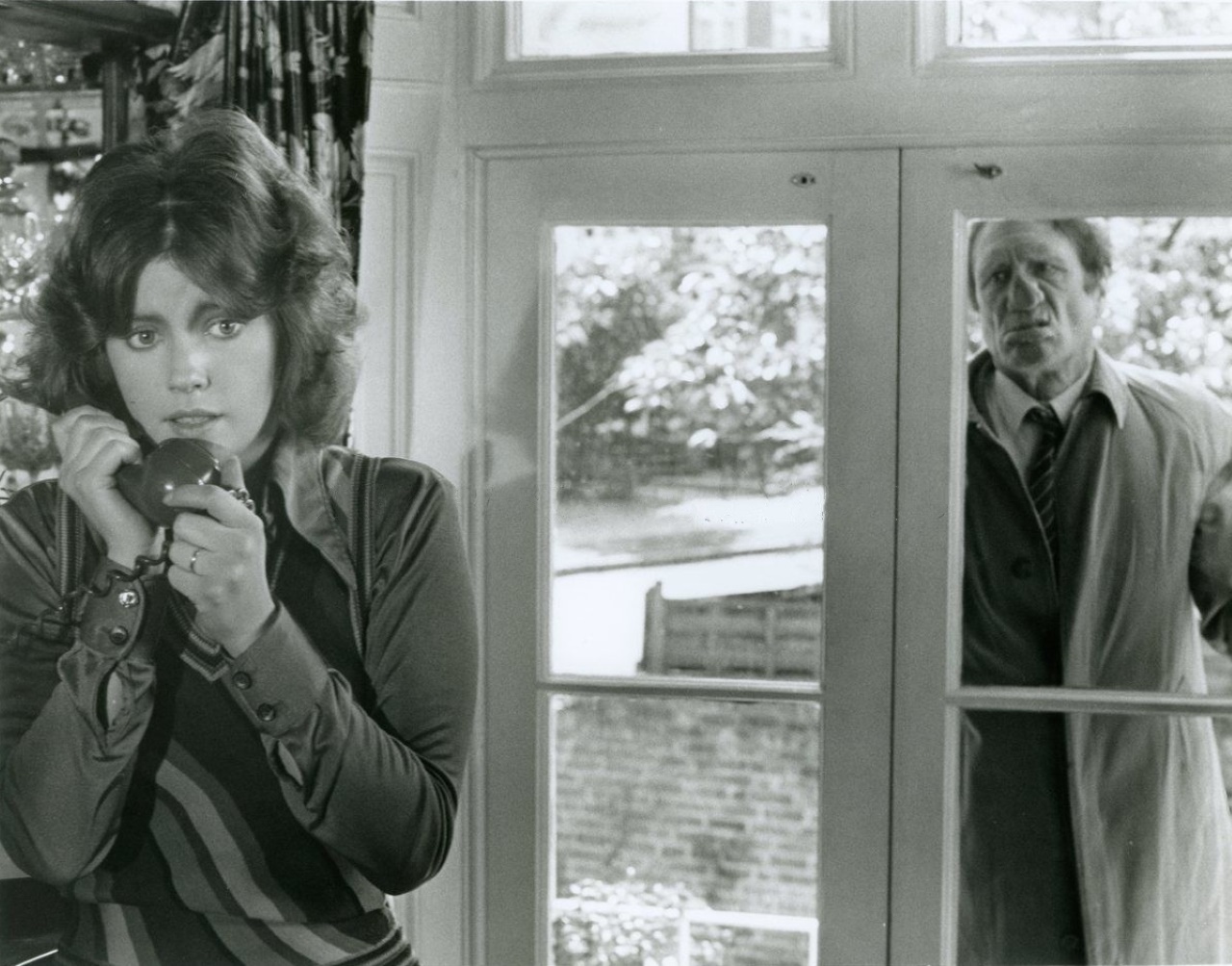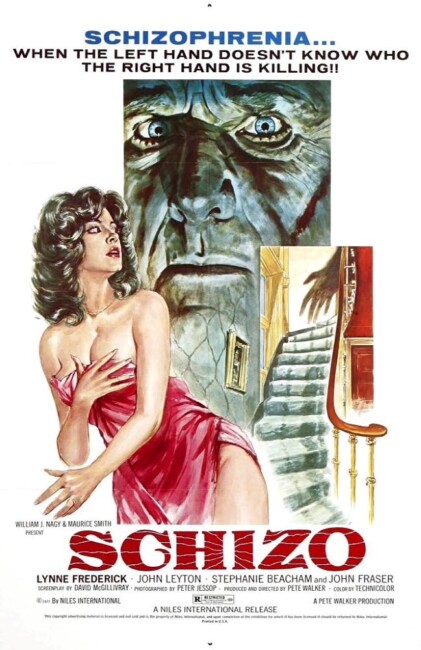Crew
Director/Producer – Pete Walker, Screenplay – David McGillivray, Photography – Peter Jessop, Music – Stanley Myers, Makeup Supervisor – George Partleton, Art Direction – Chris Burke. Production Company – Peter Walker (Heritage) Ltd.
Cast
Lynne Frederick (Samantha Gray Falconer/Jean Longmarsh), Jack Watson (William Haskin), John Leyton (Alan Falconer), Stephanie Beacham (Beth), John Fraser (Leonard), Queenie Watts (Mrs Wallace), Tricia Mortimer (Joy Wallace), Victoria Allum (Samantha as a Child)
Plot
Ice-skating champion Samantha Gray is about to be married to Alan Falconer. A man who has just been released from jail sees the nuptial announcements in the paper and follows Samantha to London. There he stalks her, leaving bloodied knives by the wedding cake and in her supermarket trolley. Samantha becomes paranoid but nobody else can see any evidence of her stalker and think that she is going mad. Next, someone starts to kill the people around her.
Not many genre purveyors have time for Britain’s Pete Walker. In the 1970s, Pete Walker made a body of psycho-thrillers that included the likes of Die Screaming Marianne (1971), The Flesh and Blood Show (1972), House of Whipcord (1974), Frightmare (1974), House of Mortal Sin/The Confessional (1976) and The Comeback (1978). Pete Walker failed to extend his popularity into the 1980s, where one might have thought he would have found welcome employ amidst the slasher cycle. Walker’s last film was House of the Long Shadows (1983), which can be measured as the last gasp of the English horror cycle.
Walker is usually dismissed as a hack director with a taste for Sadean. However, I must confess that I regard Walker’s work as better than that. He is a competent directorial stylist, his plots are usually more sophisticated than the average psycho-thrillers of the era and there is an interesting theme that runs throughout his work about the cruelty of institutional authority. It does seem high-minded of other critics who can laud the extremely sadistic works of Dario Argento and Mario Bava to the sky, yet condemn Pete Walker for the same thing.
The title of Schizo is clearly intended to invoke similarities with Psycho (1960), the film that was inspiration for the Psycho-Thriller genre that Pete Walker’s films all draw upon. (Walker even stages a shower scene at one point). The opening title card luridly misidentifies schizophrenia with split personality disorder – possibly in an attempt to invoke association with the then-recent hit true-life split personality tv drama Sybil (1976) – and emphasises talk of episodes of violence. This gives Schizo the appearance of a film that is going to be shabbily exploitative.

That said, Walker throws up some fine jumps throughout – a fine scene where Jack Watson substitutes a bloody knife for the one that Lynne Frederick is about to use to cut her wedding cake, only for him to be stopped by the officious maitre d’ for not being dressed right as goes to wheel the cake out into the hall; and a spooky scene where Lynne Frederick imagines that she is being stalked in a supermarket and decides this is not the case, only to get to the checkout and find a bloody knife in her trolley.
There is one particularly good jump that Walker throws in – the scene at the séance where medium Tricia Mortimer suddenly looks up and her eyeballs go blank white. The sense of a tatty fake séance having suddenly stepped over into something real is a genuine jolt. At other times, Walker’s jumps are crude – the mimicking of the Psycho shower scene is poorly conducted, as is the scene with deep breathing down the phone. Walker throws in some scenes of almost Argento-esque sadism – a scene where Tricia Mortimer’s head is bashed in with a hammer while she sits on a bus stop and the killer then waits for a double-decker bus to come before throwing her body out in front of it; a scene where the cleaning lady gets a knife in the back of the head and it emerges out through her eyeball. There is an effective twist ending, if one that stretches psychological credibility somewhat.
Pete Walker’s ace in the hole proves to be the lovely Lynne Frederick. Lynne Frederick has a demure beauty and it is a great mystery as to why she never became a bigger star. She appeared in only about a dozen films, including a surprising number of genre ones – No Blade of Grass (1970), The Amazing Mr Blunden (1972), Vampire Circus (1972) and Phase IV (1974). She married Peter Sellers in 1977 and, following his death in 1980, faded away into obscurity and never worked as an actress again. One was shocked to learn of her death of alcoholism in 1994 at the age of only 40. Jack Watson also has an effectively sullen presence as the father.


